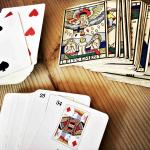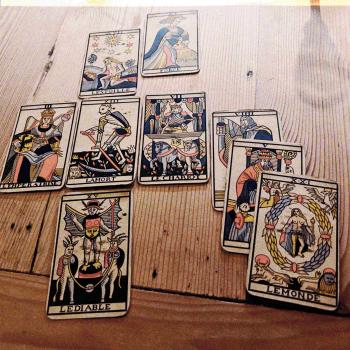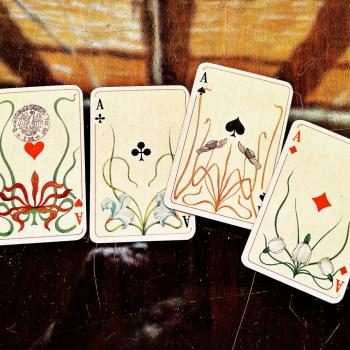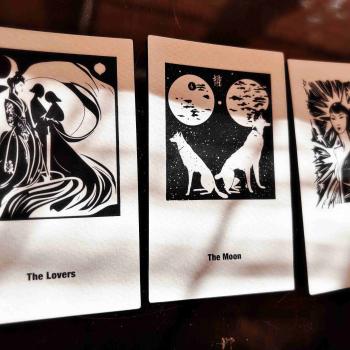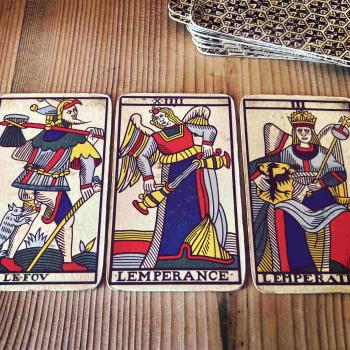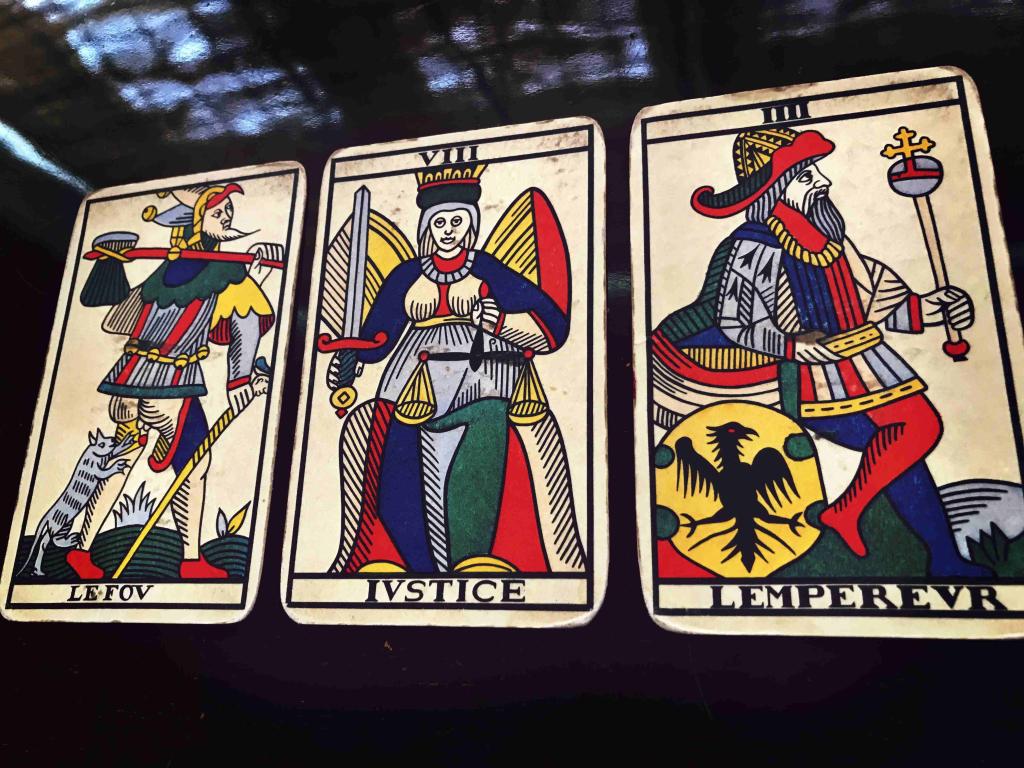
I have many stories of my own about how we confuse emotions with reality, when in fact, when you think about it, you realize that all emotions are subject to manufacturing. The ‘reality’ that goes into them is the reality of what is being broadcast in the media, the immediate family, and other social circles. Likewise in self-help circles, it’s very amusing to me when people entice you to sit with your emotions. I always want to retort back: ‘by your emotions you mean, the manufactured and imported ones, right?’
Connected to the world of wisdom and spirituality, here’s my favorite story. A story that the actor Richard Gere tells in an interview with the Buddhist magazine, Tricycle, from 1996, about meeting the Dalai Lama and talking about emotions. The relevant passage goes like this:
“I’ve talked to His Holiness [the Dalai Lama] about this many times, and he’s asked if those are real emotions I feel when I’m acting. Once I said that ultimately it’s better work when you’re really feeling, meaning when emotions come spontaneously and mysteriously and fully. They’re real. You believe they’re real. He looked very deeply into my eyes for what seemed like a very long time, and he just started laughing. He thought it was the funniest thing… I think it’s the illusory nature of emotions that he was amused by. How funny to think they’re real. Even in this bogus context of acting, I’m aware that I am making these emotions happen. I’m the magician who’s making these emotions appear, and yet I still think they’re real. That’s the difference between me and an enlightened person: an enlightened person always knows.”
In the context of reading cards, we get to emotions by going through a series of identifications. Mirrors are being held up to our eyes, and we start desiring, fearing, getting excited, or feeling horror. If the fortuneteller doesn’t address any of these mirrored emotions, she is deemed incompetent. Even the Zen fortuneteller claiming her premise for operation on a territory devoid of illusion will have a hard time, for what people want is nothing more than to participate in what caters to their ever so classic and manufactured expectations: to be loved, to be seen, to be validated, and to be understood. All grand, but on further investigation, what are these expectations based on, exactly? In my case I check with the cards. I don’t believe what the cards say, as I’m quite Zen for any beliefs, but I ask the cards about beliefs, especially those related to the circularity of value and its constructedness.
As all emotions stem from beliefs, they are all put in the service of beliefs. One chief strategy of surviving is to make people believe in your value as a good and decent human being, one who is skilful and wise, too. You tell people that you’re a good daughter, son, mother, father, activist, and then see them nod. A feeling of goodwill arises in the opportunity to let others mirror themselves in your story of being a valuable human being, unique, authentic, compassionate… and rich. Or wait, since I’m now legitimately stretching it here due to what is currently in vogue, first you’re a good human being but poor, yet now an even more excellent human being… and rich – life taught you many things, after all.
Now, the manufactured emotion that this story elicits is happiness tied to this formula: ‘nothing succeeds like success.’ It is ever so simple. Look at the so-called ‘success’ stories around you. When somebody wants money from you, all they have for you is their own story of how much money they make on a daily, monthly, or yearly basis. One needs to be specific, after all. There’s ‘authenticity’ in that. But the premise for the formula, ‘nothing succeeds like success,’ is not about the process of how you get there, but rather about activating fear, or the feeling of inadequacy. Once that fear is primed, there’s nothing you won’t do for the creation and preservation of your own self-value. First you were fearful. Now you’re fearless. From rags to riches. Self-value is the currency, and the broadcasting of self-proclamations that cast you in the role of the biggest, maddest, and baddest magician is the vehicle for transacting with this self-value. À la Richard Gere, you go through the motions of inducing how being successful feels like, until this emotion becomes real. Or so you think…
Now, I’m no Dalai Lama, so I may not be able to laugh so heartily at the whole range of emotions that go into just this simple story of success, but laugh I can, nonetheless, for what we’re talking about here is a game, a play of masks, not reality. In response to the madness that goes into all beliefs, I like to throw cards and check with my own delusions. As soon as I catch myself identifying with some mirror that’s put in my face, one that shows me in a light I like to see, I pinch myself – I’m as much into virtue-signaling as I’m into fashioning identity… As a counter to that I rather like to cancel myself with the cards. In the process, I gain the proper boldness that enables me to say to another: ‘It’s foolish to believe that what you need is yet another list of bulleted hard wisdoms that will validate you as a king.’ This line was once delivered in connection with a question that was about this concern: ‘I want to believe the story of the empowerment that this teacher promises, but I’m not sure I can.’
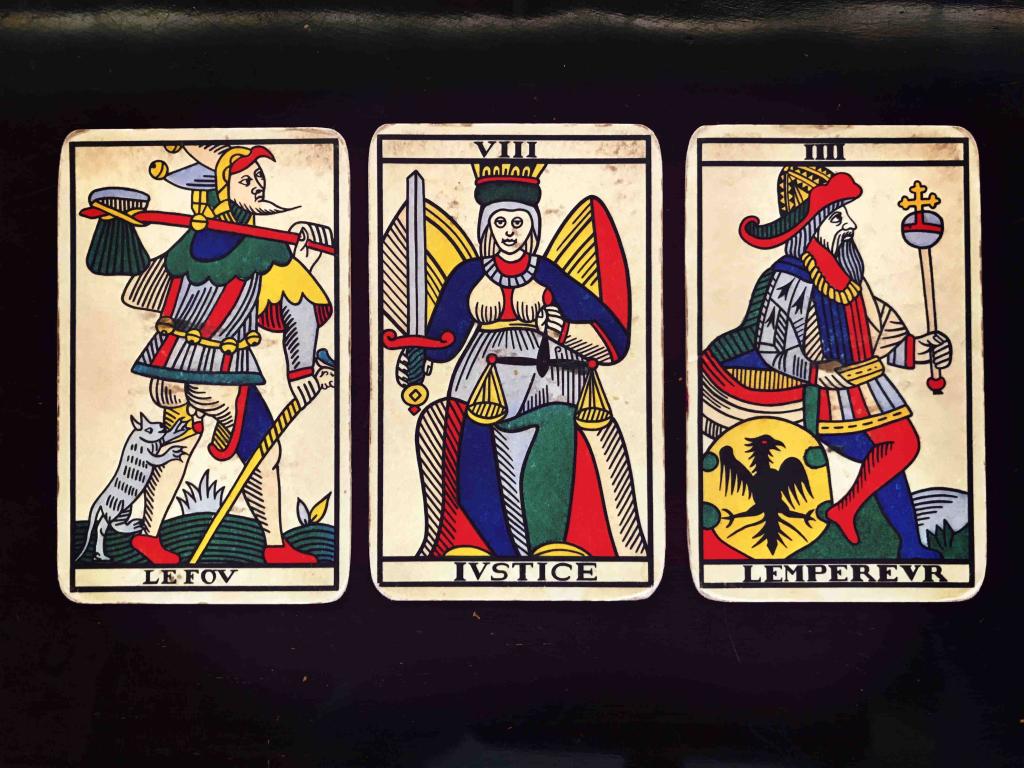
Seeing the obvious made the answer simple. With the Fool present in the string of cards above, my sitter got a confirmation of just what he was fearing, his own foolish belief in the promise of processual power. So I said, ‘although we may argue that the Fool can be methodical in learning about power’ – if we just looked at the cards – the reality is that, in response to the question of doubting such a possibility, the answer is that there’s a good reason for it, for the higher and tested wisdom here that we know of is this: ‘Once a fool, always a fool…’ Had the Magician been here instead of the Fool, we might have had a redemptive story in place, for, ‘fake it till you make it,’ has also proven its validity. But alas, a fool is still a fool. He may fall for the promise to be king, but that is all he gets out of it, a fall. The Emperor promising riches has his eyes on his own ball. His own true Justice is to act in his own interest, not that of the Fool.
What I did here is actually point to a subtle distinction between correspondences and evocations. As each figure in these cards performs a function, it evokes a particular emotion. But is this emotion without an anchor? It is not, simply because the emotion is already filtered through the question asked. And in my class, we answer questions, not delude ourselves about how we might also answer, if this, or that, or the third and the fifth…
For more such practice with the cards, join the Read like the Devil Practice Club. Visit also Aradia Academy and sign up for the newsletter that will keep you informed on upcoming courses and cartomantic activities. Note the Off the Shelf offering that also includes free resources.



